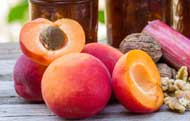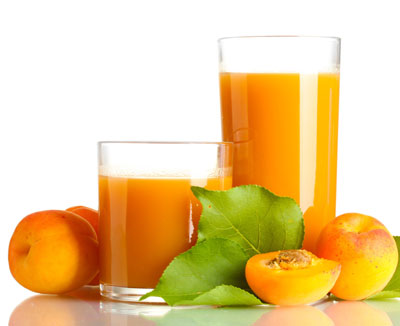





1. Apricot Facts
2. Types of Apricots
3. Apricot Nutritional Value
4. Apricot Health Benefits
An apricot is a fruit, or the tree that bears the fruit, of several species in the genus Prunus. Usually, an apricot is from the species Prunus armeniaca, but the fruits of the other species in Prunus sect. Armeniaca are also called apricots.
Prunus armeniaca was domesticated in ancient times in Central Asia and China. Cultivation of the tree then spread across Eurasia and to North Africa and Japan. The fruit is consumed both fresh and dried. Apricots are used in dishes including cakes, tarts, and jam, and in savoury dishes, for example in stuffing. In Austria, they are the basis of Marillenknödel, sweet apricot dumplings.
It is extensively cultivated in many countries and has escaped into the wild in many places.
History and Origin
Apricots originated in China and Central Asia, domesticated as early as 3000 BC and later spread via the Silk Road. They were introduced to the Roman Empire through Greece around 70–60 BC and eventually made their way to the New World with Spanish and English colonists. The fruit's path to Europe was slow, becoming an important crop in Europe only around the 17th century.
- • Trevatt
- • Moorpark
- • Divinity
- • Bulida
- • Fireball
Common apricot types sold and grown in Australia include Trevatt, Moorpark, Divinity, Fireball, and Bulida. These varieties vary in flavour, size, and ripening time, with options suitable for fresh eating, drying, or warmer climates. Some popular options for home growers are Trevatt, Moorpark, and Divinity due to their flavour and reliability.
Popular apricot types
Trevatt: An Australian heirloom that is good for early season harvesting and excellent for drying due to its firm texture.
Moorpark: A classic variety with large, juicy fruit, popular for eating fresh and available in dwarf forms for home gardens.
Divinity: A mid-season apricot with a slightly smaller fruit but excellent flavour, bred in South Australia.
Fireball: An early-ripening variety with deep orange, sweet fruit that is popular for its traditional apricot taste.
Bulida: Produces large, sweet, golden-orange fruit and is suitable for most temperate regions of Australia.
Other notable varieties
Goldrich: Known for large, oval fruit with a deep orange flesh and good flavour.
Castlebrite: A prolific tree with golden-yellow freestone fruit.
Tilton: Valued for its intense flavour, making it good for fresh eating, jams, and preserves.
Hunter: Features firm, tasty, deep orange flesh that is great for eating fresh and home drying.
Katy: A US-introduced variety with sweet, juicy flesh and vibrant orange-red skin.
Mystery: A late-season apricot from Australia's Riverland, yielding large, firm, and flavourful fruit
Fruit ” Apricot ” ( Nutritional value )
Nutritional value per 100 g
Apricots, raw
|
Nutrient ( Proximate’s )
|
Unit
|
Value
|
Daily Value %
|
|
Energy
|
kcal
|
48
|
2.4%
|
|
Protein
|
g
|
1.40
|
2.8%
|
|
Total lipid (fat)
|
g
|
0.39
|
0.5%
|
|
Carbohydrate, by difference
|
g
|
11.12
|
4.0%
|
|
Fiber, total dietary
|
g
|
2.0
|
7.1%
|
|
Sugars, total
|
g
|
9.24
|
|
|
Minerals
|
|||
|
Calcium, Ca
|
mg
|
13
|
1%
|
|
Iron, Fe
|
mg
|
0.39
|
2.1%
|
|
Magnesium, Mg
|
mg
|
10
|
2.3%
|
|
Phosphorus, P
|
mg
|
23
|
1.8%
|
|
Potassium, K
|
mg
|
259
|
5.5%
|
|
Sodium, Na
|
mg
|
1
|
0.04%
|
|
Zinc, Zn
|
mg
|
0.20
|
1.8%
|
|
Copper, Cu
|
mg
|
0.078
|
8.6%
|
|
Manganese, Mn
|
mg
|
0.077
|
3.3%
|
|
Selenium, Se
|
mcg
|
0.1
|
0.1%
|
|
Vitamins
|
|||
|
Vitamin C, total ascorbic acid
|
mg
|
10.0
|
11.1%
|
|
Thiamin (B-1)
|
mg
|
0.030
|
2.5%
|
|
Riboflavin (B-2)
|
mg
|
0.040
|
3.0%
|
|
Niacin (B-3)
|
mg
|
0.600
|
3.7%
|
|
Pantothenic acid (B-5)
|
mg
|
0.240
|
4.8%
|
|
Vitamin B-6
|
mg
|
0.054
|
3.1%
|
|
Vitamin B-12
|
mg
|
0.00
|
|
|
Folate (B-9)
|
mcg
|
9
|
2.2%
|
|
Vitamin A, RAE (retinol)
|
mcg
|
96
|
10.6%
|
|
Vitamin E (alpha-tocopherol)
|
mg
|
0.89
|
5.9%
|
|
Vitamin D
|
mcg
|
0
|
|
|
Vitamin K (phylloquinone)
|
mcg
|
3.3
|
2.7%
|
|
Lipids
|
|||
|
Saturated Fatty Acids
|
g
|
0.027
|
0.1%
|
|
Monounsaturated Fatty Acids
|
g
|
0.170
|
|
|
Polyunsaturated Fatty Acids
|
g
|
0.077
|
|
|
Trans Fatty Acids
|
g
|
0.000
|
|
|
Carotenoids
|
|||
|
Beta-Carotene
|
mcg
|
1094
|
|
|
Alpha-Carotene
|
mcg |
19
|
|
|
Beta-Cryptoxanthin
|
mcg
|
104
|
|
|
Lutein + zeaxanthin
|
mcg
|
89
|
|

|
Reference Values are based on a 2,000 Calorie Intake, for Adults and Children 4 or More Years of Age. Your daily values may be higher or lower depending on your calorie needs.
|
|
Percentages are roughly approximated using (RDA) Recommended Dietary Allowances for adults. Source: USDA United States Department of Agriculture
|
|
Reference Values for Nutrition – FDA U.S. Food and Drug Administration
|
Apricot Nutritional Value
Apricots offer numerous health benefits, including supporting eye health, boosting heart health through potassium and fiber, and aiding digestion. They are a good source of antioxidants like vitamins A, C, and E, which protect against cell damage, and flavonoids that help reduce inflammation and the risk of diseases like diabetes and heart disease.
- HEART HEALTH
Apricots support heart health by providing potassium, fiber, and antioxidants that help regulate blood pressure, lower "bad" LDL cholesterol, and protect against oxidative stress. The potassium in apricots helps balance sodium to maintain healthy blood pressure, while the soluble fiber helps lower cholesterol levels and reduce the risk of cardiovascular disease. Antioxidants, including flavonoids like quercetin and catechin, help reduce inflammation and oxidative stress linked to heart disease. Regular intake of bitter apricot seeds may potentially be useful for prevention of heart diseases. - ANTIOXIDANT PROTECTION
Apricots offer antioxidant protection due to high levels of vitamins A, C, and E, along with beneficial flavonoids and carotenoids, which neutralize harmful free radicals and protect cells from damage, reducing the risk of chronic diseases and supporting eye health, skin, and cardiovascular function. - EYE HEALTH
Apricots offer antioxidant protection due to high levels of vitamins A, C, and E, along with beneficial flavonoids and carotenoids, which neutralize harmful free radicals and protect cells from damage, reducing the risk of chronic diseases and supporting eye health, skin, and cardiovascular function. - FLAVONOIDS
Apricots contain various flavonoids, which are powerful antioxidants that help protect the body from inflammation and cellular damage. Key flavonoids found in apricots include catechin, quercetin, chlorogenic acid, and kakans. These compounds are linked to a reduced risk of diseases such as heart disease, diabetes, obesity, and age-related eye and skin damage.

- SKIN AND HAIR HEALTH
Apricots, particularly apricot kernel oil, benefit skin and hair by providing vitamins A and E, essential fatty acids, and antioxidants. For skin, these nutrients moisturize, promote cell rejuvenation, and have anti-aging properties, making it good for dry and sensitive skin. For hair, it hydrates and softens the scalp, reduces frizz, adds shine, and promotes growth by strengthening follicles. - DIGESTIVE HEALTH
Apricots support digestive health due to their high fiber content (both soluble and insoluble), which promotes regularity and prevents constipation. They also contain sorbitol, a sugar alcohol with a mild laxative effect, and potassium, which helps with muscle contractions in the digestive tract. - HYDRATION
Apricots help with hydration because they are made of about 85% water and also contain electrolytes like potassium. This water and electrolyte content is vital for maintaining fluid balance in the body, which supports functions like regulating blood pressure and keeping skin healthy. For maximum hydration, fresh apricots are the best option, as dried apricots have less water, though soaking them can help. - FIGHTS OXIDATIVE STRESS
Apricots fight oxidative stress due to their high content of antioxidants, such as vitamins A, C, and E, and polyphenols like flavonoids. These compounds neutralize free radicals, which are unstable molecules that damage cells and contribute to oxidative stress and chronic diseases. The antioxidants in apricots can protect against cellular damage, inflammation, and age-related diseases, and may improve liver and eye health.
References
Nutrient Database – USDA (United States Department of Agriculture)
Reference Values for Nutrition – FDA U.S. Food and Drug Administration
Antioxidant Protection - Apricots offer antioxidant protection due to high levels of vitamins A, C, and E, along with beneficial flavonoids and carotenoids, which neutralize harmful free radicals and protect cells from damage, reducing the risk of chronic diseases and supporting eye health, skin, and cardiovascular function
Eye Health - Apricots offer antioxidant protection due to high levels of vitamins A, C, and E, along with beneficial flavonoids and carotenoids, which neutralize harmful free radicals and protect cells from damage, reducing the risk of chronic diseases and supporting eye health, skin, and cardiovascular function.
Vitamin A and Beta-Carotene (Apricots are an excellent source of beta-carotene, which the body converts to vitamin A. This vitamin is essential for good vision, helping to prevent night blindness and age-related eye diseases).
Fights oxidative stress - Apricots fight oxidative stress due to their high content of antioxidants, such as vitamins A, C, and E, and polyphenols like flavonoids. These compounds neutralize free radicals, which are unstable molecules that damage cells and contribute to oxidative stress and chronic diseases. The antioxidants in apricots can protect against cellular damage, inflammation, and age-related diseases, and may improve liver and eye health.
Digestive Health - Apricots support digestive health due to their high fiber content (both soluble and insoluble), which promotes regularity and prevents constipation. They also contain sorbitol, a sugar alcohol with a mild laxative effect, and potassium, which helps with muscle contractions in the digestive tract.
Fiber (Apricots provide both soluble and insoluble fiber, which are vital for a healthy digestive system. Fiber aids digestion, regulates bowel movements, helps prevent constipation, and feeds beneficial gut bacteria).
Skin and Hair Health - Apricots, particularly apricot kernel oil, benefit skin and hair by providing vitamins A and E, essential fatty acids, and antioxidants. For skin, these nutrients moisturize, promote cell rejuvenation, and have anti-aging properties, making it good for dry and sensitive skin. For hair, it hydrates and softens the scalp, reduces frizz, adds shine, and promotes growth by strengthening follicles.
Vitamins A and E: These vitamins contribute to the health of your skin and hair.
Vitamin C: This vitamin helps increase collagen production in the skin, which can help slow signs of aging.
Heart Health - Apricots support heart health by providing potassium, fiber, and antioxidants that help regulate blood pressure, lower "bad" LDL cholesterol, and protect against oxidative stress. The potassium in apricots helps balance sodium to maintain healthy blood pressure, while the soluble fiber helps lower cholesterol levels and reduce the risk of cardiovascular disease. Antioxidants, including flavonoids like quercetin and catechin, help reduce inflammation and oxidative stress linked to heart disease. Regular intake of bitter apricot seeds may be considered potentially useful for prevention of cardiovascular diseases
Fiber: The soluble fiber in apricots can help maintain healthy cholesterol levels.
Potassium: This mineral is crucial for healthy blood pressure and heart function.
Hydration - Apricots help with hydration because they are made of about 85% water and also contain electrolytes like potassium. This water and electrolyte content is vital for maintaining fluid balance in the body, which supports functions like regulating blood pressure and keeping skin healthy. For maximum hydration, fresh apricots are the best option, as dried apricots have less water, though soaking them can help.
Water Content: Fresh apricots are about 86% water, making them a great way to stay hydrated and support the body's natural processes.
